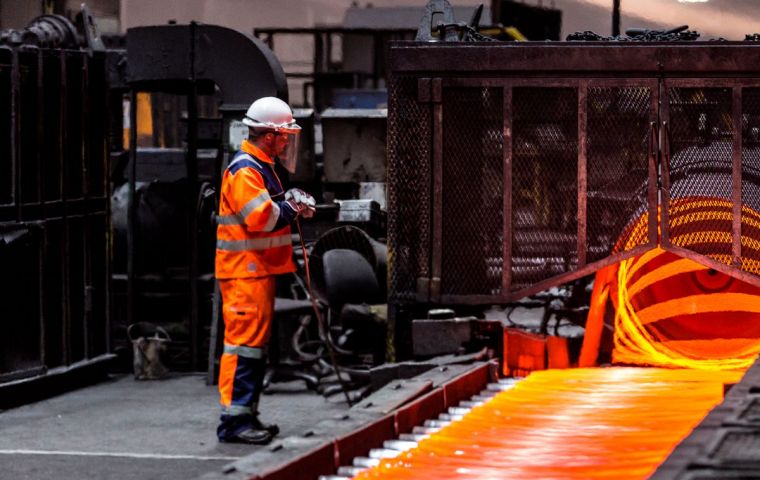MercoPress. South Atlantic News Agency
British Steel and 25.000 jobs on the brink: waiting for government life line
 British Steel said negotiations had not concluded and it continues to work with all parties to secure the future of the business
British Steel said negotiations had not concluded and it continues to work with all parties to secure the future of the business British Steel, the country’s second-largest steel producer, is on the brink of collapse unless the government agrees to provide an emergency 30 million pound (US$ 38 million) loan, two sources close to the situation said.
British Steel said negotiations had not concluded and it continues to work with all parties to secure the future of the business. It also reassured employees that their salaries will be paid in full for May.
Owned by investment firm Greybull Capital, British Steel employs around 5,000 people, mostly in Scunthorpe, in the north of England, while 20,000 more depend on its supply chain.
Greybull, which specializes in trying to turn around distressed businesses, paid former owners Tata Steel a nominal one pound in 2016 for the loss-making company which they renamed British Steel.
British Steel had asked the government for a 75 million pound loan but has since reduced its demand to 30 million pounds after Greybull agreed to put up more money, according one of the sources, who is close to the negotiations.
Greybull was also the owner of Monarch, an airline that went bust in October 2017.
Andrew Stephenson, a junior business minister, told parliament the government was in discussions with the company and will “leave no stone unturned in its support for the industry”. He added the government has been in contact with former British Steel owner Tata Steel.
The possible collapse of British Steel comes after Germany’s Thyssenkrupp and India’s Tata Steel ditched a plan this month to merge their European steel assets to create the EU’s second largest steelmaker after ArcelorMittal.
The collapsed merger leaves the wider EU steel sector fragmented and vulnerable to economic downturns. It also calls into question the fate of Britain’s largest steelworks in Port Talbot, Wales, owned by Tata Steel.
Stephenson said he held talks with Tata Steel this week about issues relating to Port Talbot, and that the India-based steelmaker had painted a positive picture of the site.
After making a profit in 2017, British Steel cut around 400 jobs last year, blaming factors such as the weak pound.
Earlier this month, it appeared to have secured the backing of lenders and shareholders to continue operating after the uncertainty around Brexit hammered its order book.
“The whole manufacturing sector is crying out for certainty over Brexit, unable to plan the trading relationship it will have with its biggest market. We can only state again the need to avoid a no-deal scenario at all costs,” said industry group UK Steel.




Top Comments
Disclaimer & comment rulesCommenting for this story is now closed.
If you have a Facebook account, become a fan and comment on our Facebook Page!